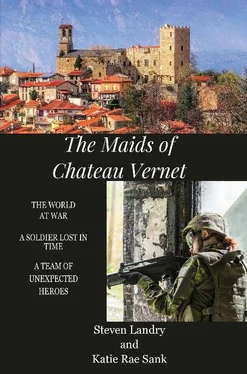He flipped through the stack one more time and stopped at an old black and white, plastic coated photo of his father as a child. A woman who resembled Rachel held him close. Three names had been written on the back of the image:
Jonah, Danette, and Silas Halphen◦– May 7, 1938
“Well, you’re not my father,” he said. He turned the photo over and stared at the smiling, faded faces. He had gone through the pictures a hundred times, maybe more, and never read the notation on the back of this single image. He scolded himself for not paying closer attention. But now that he travelled farther than he ever imagined from home, he wanted their support. He needed his family with him.
The alarm in the pod dinged for the second time. Two hours. The intensity of his headache blossomed at the sound. He closed his eyes and took a few breaths before sealing the pictures back in the box. He gathered a bit of camping gear, tucked the wooden box inside his pack, and climbed out of the pod. Tonight, he planned to sleep beneath the stars.
He settled in at the edge of the woods, started up a small camp stove, and prepared an MRE labeled chicken and rice. As he spooned food out of the desert colored pouch, Hiram looked through the box of pictures again.
He stopped on the old black and white photo again. 1938 . “Family is family” his father had once said during his early genealogical research. Moshi always rooted for their family. They had all survived terrible times because of his support and encouragement. The happy family stared back at Hiram from the plastic-coated image as if waiting for him to catch on to a master plan not yet disclosed to him.
“Family,” he said. “I’ve got family here!”
Hiram pulled up his father’s most recent version of their family history. Moshi Halphen held a professor of history position at Tel Aviv University and had been compiling a detailed study of the Halphen family’s history. Each time he discovered a new branch of the family or found a saucy bit of information, he sent it on to both Hiram and Rachel, highlighting the installment’s most intriguing contents. Hiram appreciated the small gifts more and more as he grew older. As he read the current revision date on the file, he realized this version would be the last.
He scrolled through the early years of the Halphen family until he reached a section titled World War II. The bolded words made his heart stop.
Hiram searched the text for each of the names scribbled on the old photo. Jonah had passed without warning in 1939. As things started to turn sour in Europe, young Silas had been shipped off to live with relatives in America. Danette Halphen, Hiram’s great-great-grandmother, crossed France in one of the Holocaust trains headed for a camp in Upper Silesia, Poland in August of 1942. Auschwitz . Hiram stopped reading. He picked up the picture again and touched the face that resembled his sister Rachel.
A small section beside the text highlighted Moshi’s research effort. “I spent the afternoon searching though the archived prisoner manifests for the Holocaust trains that moved the deportees from Drancy to Auschwitz. I discovered that Danette Halphen, your great-great-grandmother, spent less time at Drancy than I originally thought. After four months at Camp Joffre in Rivesaltes, she was transported via convoy to the internment camp in Drancy. She arrived at Drancy on August 13, 1942. Just fifteen days later, on August 28, 1942, she was transferred to Auschwitz on Transport 25, Train 901-20.” If his father’s research was correct, at this very moment Danette would be in a Vichy internment camp near Rivesaltes in the department of Pyrénées-Orientales, in the unoccupied French State, more commonly known as Vichy France.
Hiram was a soldier and it would take a physicist to figure out how he had been thrown back in time, though he surmised the nuclear explosion had something to do with it. He’d first been taught the physics of temporal artifacts in high school, knowledge that had pretty much gone in one ear and out the other. Like the C2ID2, he knew how to use the pods, but didn’t really understand how they worked. He recalled a discussion about the Butterfly Effect, which postulated that even the tiniest change to the past would have tremendous effects on the future. Hiram reasoned that he had changed the future just by exiting the pod in 1942. He was one man. What kind of damage could one man really do? “Step on a butterfly,” he said aloud. A small creature wriggled in the tree above him, the threat seeming to make it nervous. “I haven’t done anything yet,” he yelled at the animal.
He stared at the faces in the image one more time. He had to take the chance to save his great-great-grandmother. And then he would see what could be done about Vichy and the Nazis.
1320 hours, Early Afternoon, Monday, July 6, 1942, Pyrénées-Orientales Department, Vichy France
Hiram waited in a covered and concealed foxhole on a slope overlooking a mountain road near the junction of the French, Andorran, and Spanish borders. He followed the progress of an approaching convoy via an overhead drone’s video feed to the C2ID2’s auxiliary monitor, which rested on his knees. The C2ID2 connected to his other two companions: a small wheeled recon robot watching the road a kilometer to the east of his ambush site; and a larger armed combat robot watching the ambush site from the other side of the road with its weapons sighting sensors. The remote devices returned images from each viewpoint along with a myriad of other unnecessary data. Other than a fat fox, nothing travelled the road.
The road below made a sharp turn from south to east and ran parallel to a stream. Voluminous evergreens lined the far bank of the stream in front of him, backed by jagged, white-capped mountain crests. The forest extended all around him, interrupted only by the mountains and the well-worn dirt road. One of the heavy trees lay across the road, preventing any vehicles from passing.
The dry heat he had become accustomed to had slowly given way to a cooler, wetter climate during his journey west. In the cooling shadow of his foxhole, he considered reaching into the pod for a blanket or a heater. He figured he’d find one. Whoever prepped the damn storage bin had thought of everything.
The genius behind the pod provided Hiram with all the tools he needed to escape with all the prisoners in the convoy. Access to dated maps and historical references provided a time and place to set the plan in motion. The never-ending supply of gear, including food, water, and clothing, would be necessary to support the needs of those he intended to rescue. He had yet to find any limitations on what the pod made available. Up to this point, he found the pod’s most valuable asset was the electric-drive, rigid-hull inflatable boat, or RHIB. He had used the boat to cross the sea from India to the Gulf of Aqaba. When the waterway ended, he had trekked across the Sinai Desert, travelling only at night. He avoided the extreme heat of the day by hiding inside a camouflaged cool flow blackout tent that converted the outside heat into a power source for a cooling unit. When he reached the Sinai coast, he climbed back into the RHIB and made his way to southern France.
The approaching convoy consisted of three vehicles◦– a command car followed by two trucks. As usual, the French police sergeant in charge of this detail had settled his 300-pound frame in the command car’s spacious rear compartment. Three other policemen rode in the command car. A civilian drove each of the open-backed trucks, both hauling two policemen and eighteen exhausted female prisoners.
The convoy had set out an hour earlier from a chateau high in the Pyrenees bound for Camp Joffre, the internment camp at Rivesaltes. The women, all Jewish, were forced to serve as maids at a weekend retreat for Vichy government officials in the spa town of Vernet-les-Bains. Weekday business lacked the volume to justify keeping, or feeding, the women. So, they made the seventy-kilometer journey to the chateau each Friday afternoon and returned to the camp on Monday.
Читать дальше












